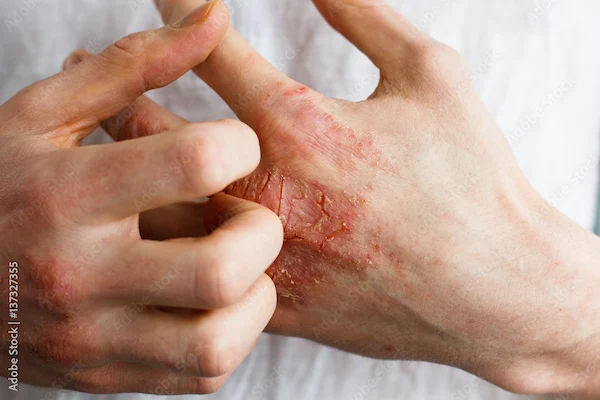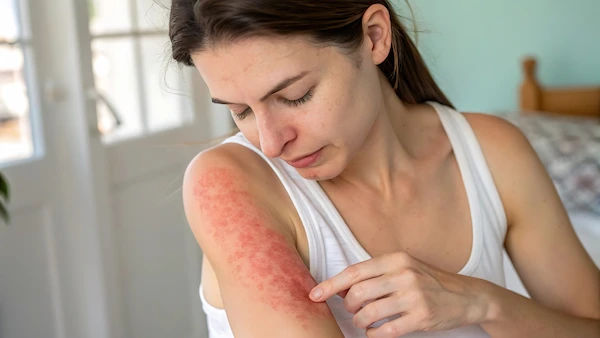Effective Treatments for Eczema
know about the causes, symptoms of eczema. Learn about the effective ways to treat it and lifestyle modifications.

Written by Dr. Siri Nallapu
Reviewed by Dr. D Bhanu Prakash MBBS, AFIH, Advanced certificate in critical care medicine, Fellowship in critical care medicine
Last updated on 11th Aug, 2025

Introduction
Eczema, also known as atopic dermatitis, is a common skin condition that causes itchy, red, and inflamed patches on the skin. It can be frustrating and uncomfortable, but the good news is that there are effective treatments available to manage symptoms and improve skin health.
If you or a loved one is struggling with eczema, this guide will help you understand the condition, its causes, symptoms, and the best ways to treat and manage it for long-term relief.
Understanding Eczema: What Causes It?
Eczema is a chronic skin condition that often starts in childhood but can affect people of all ages. While the exact cause is unknown, experts believe it’s linked to:
- Genetics – If your family has a history of eczema, asthma, or allergies, you may be more prone to them.
- Immune system overreaction – The body’s defence system reacts too strongly to irritants, leading to inflammation.
- Skin barrier dysfunction – People with eczema often have a weakened skin barrier, making it easier for moisture to escape and irritants to enter.
- Environmental triggers – Common triggers include dry air, harsh soaps, stress, sweat, dust mites, and certain foods.
Common Symptoms of Eczema
Eczema symptoms can vary from mild to severe and may include:
- Dry, scaly patches on the skin
- Intense itching, especially at night
- Red or brownish-grey rashes (common on hands, feet, elbows, knees, and face)
- Swelling and oozing in severe cases
- Thickened, cracked skin from repeated scratching
If left untreated, eczema can lead to skin infections due to constant scratching. That’s why early treatment is essential!
Consult a top skin specialist for the best advice
Effective Treatments for Eczema
While there’s no permanent cure for eczema, the right treatment can control flare-ups, reduce itching, and heal the skin. Here are some of the most effective options:
1. Moisturisers (Emollients)
Keeping the skin hydrated is the first and most important step in eczema care.
- Use fragrance-free, thick creams or ointments (like petroleum jelly or ceramide-based moisturisers).
- Apply immediately after bathing to lock in moisture.
- Avoid lotions with alcohol, as they can dry out the skin.
2. Topical Steroids (Corticosteroid Creams)
These anti-inflammatory creams help reduce redness and itching during flare-ups.
- Mild steroids (hydrocortisone) are used for mild eczema.
- Stronger steroids (prescription-based) may be needed for severe cases.
- Always use as directed by a doctor to avoid side effects like thinning skin.
3. Non-Steroidal Topical Treatments
For those who prefer steroid-free options, these alternatives can help:
- Calcineurin inhibitors (Tacrolimus, Pimecrolimus) – Reduce inflammation without steroids.
- PDE4 inhibitors (Crisaborole) – A newer treatment for mild-to-moderate eczema.
4. Antihistamines (For Itch Relief)
Oral antihistamines like Cetirizine or Diphenhydramine can help control nighttime itching, allowing better sleep.
5. Wet Wrap Therapy
This technique involves:
1. Applying moisturiser or medication to the skin.
2. Covering it with damp bandages or clothing.
3. Adding a dry layer on top.
This helps deeply hydrate the skin and is especially useful for severe eczema.
6. Phototherapy (Light Therapy)
For chronic eczema, doctors may recommend controlled UV light exposure to reduce inflammation.
7. Biologic Medications (For Severe Cases)
Newer injectable medications like Dupilumab (Dupixent) target the immune system to prevent flare-ups in moderate-to-severe eczema.
8. Lifestyle & Home Remedies
Simple changes can make a big difference:
- Avoid triggers – Identify and stay away from irritants like harsh soaps, wool, or certain foods.
- Short, lukewarm showers – Hot water dries out the skin.
- Use gentle, fragrance-free cleansers.
- Wear soft, breathable fabrics (cotton is best).
- Manage stress – Stress worsens eczema, so try relaxation techniques like yoga or meditation.
When to See a Doctor?
Consult a dermatologist if:
- Your eczema isn’t improving with over-the-counter treatments.
- The skin becomes infected (oozing, crusting, or painful swelling).
- The itching disrupts your sleep or daily life.
Final Thoughts
Eczema can be uncomfortable and frustrating, but with the right treatment and care, you can control flare-ups and keep your skin healthy. Remember: Moisturise daily to strengthen the skin barrier, Avoid triggers that worsen symptoms, Use prescribed treatments as directed by your doctor, Seek professional help if home remedies aren’t enough.
Consult a top skin specialist for the best advice
Consult a top skin specialist for the best advice
Dr. Kavitha Killaparthy
Dermatologist
23 Years • MBBS,DIPLOMA(DERMATOLOGY,VENEREOLOGY,LEPROSY)
Hyderabad
JDS Skin & Hair Clinic, Hyderabad
Dr. Mayuri Jain
Dermatologist
11 Years • MBBS, MD Dermatology , Venereology & Leprosy
Delhi
Dr Mayuri Jain Clinic, Delhi

Dr Ekansh Shekhar
Dermatologist
10 Years • MBBS MD
Lucknow
Apollo Clinic Hazratganj, Lucknow

Dr. H R Yogeesh
Dermatologist
20 Years • MBBS, MD (Dermatology, Venereology & Leprosy)
Bengaluru
Akshata skin and hair care, Bengaluru
Dr.j Girishma
Dermatologist
6 Years • MBBS MD DERMATOLOGY
Bengaluru
Apollo Medical Center, Marathahalli, Bengaluru
Consult a top skin specialist for the best advice
Dr. Kavitha Killaparthy
Dermatologist
23 Years • MBBS,DIPLOMA(DERMATOLOGY,VENEREOLOGY,LEPROSY)
Hyderabad
JDS Skin & Hair Clinic, Hyderabad
Dr. Mayuri Jain
Dermatologist
11 Years • MBBS, MD Dermatology , Venereology & Leprosy
Delhi
Dr Mayuri Jain Clinic, Delhi

Dr Ekansh Shekhar
Dermatologist
10 Years • MBBS MD
Lucknow
Apollo Clinic Hazratganj, Lucknow

Dr. H R Yogeesh
Dermatologist
20 Years • MBBS, MD (Dermatology, Venereology & Leprosy)
Bengaluru
Akshata skin and hair care, Bengaluru
Dr.j Girishma
Dermatologist
6 Years • MBBS MD DERMATOLOGY
Bengaluru
Apollo Medical Center, Marathahalli, Bengaluru


